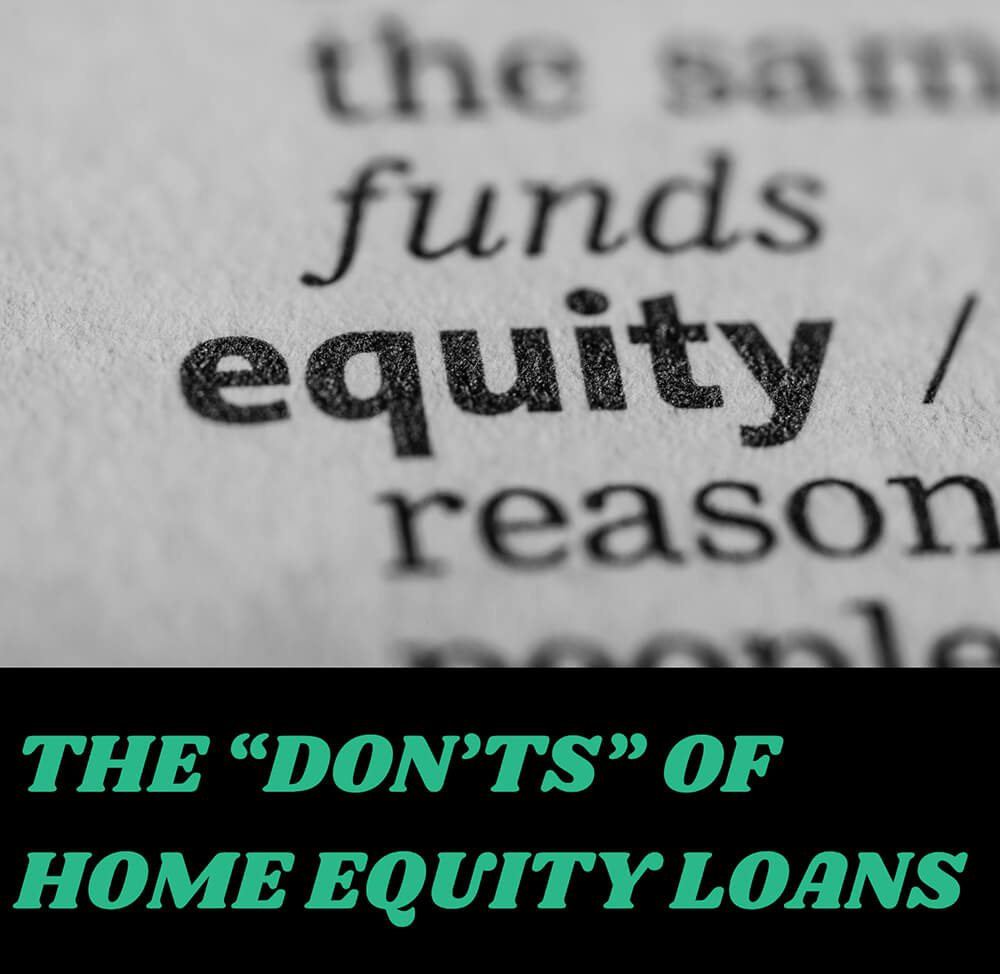
09 Jan Home Equity Loans Simplified: Borrow Smarter, Not Harder
A home equity loan, sometimes called a second mortgage, allows you to borrow against the equity you’ve built in your home. Equity is the difference between your home’s market value and the amount you owe on your mortgage.
For example, if your home is worth $300,000 and you owe $200,000 on your mortgage, you have $100,000 in equity. Lenders typically allow you to borrow up to 80-85% of your equity, depending on your creditworthiness and other factors.

The Do’s of Home Equity Loans
1. Do Use It for High-Value Investments
- Home equity loans often come with lower interest rates compared to credit cards and personal loans. Use the funds for investments that provide a high return, such as home renovations, college tuition, or starting a business.
2. Do Shop Around for the Best Rates
- Not all lenders offer the same rates or terms. Compare offers from multiple banks, credit unions, and online lenders to find the best deal.
3. Do Know Your Credit Score
- Your credit score plays a significant role in determining your interest rate. A higher score can save you thousands over the life of the loan.
4. Do Consider the Tax Benefits
- Interest on home equity loans may be tax-deductible if the funds are used to improve your home. Consult a tax professional to understand how this applies to your situation.
5. Do Understand the Terms
- Make sure you fully understand the loan’s repayment terms, including fixed vs. variable interest rates and any potential penalties for early repayment.

The Don’ts of Home Equity Loans
1. Don’t Use It for Non-Essential Purchases
- Avoid using your home equity for depreciating assets like cars, vacations, or luxury items. This could put your home at risk for unnecessary expenses.
2. Don’t Overborrow
- Just because you qualify for a large loan doesn’t mean you should take it. Borrow only what you need to avoid financial strain.
3. Don’t Ignore Your Budget
- Adding a second mortgage means higher monthly payments. Ensure your budget can comfortably accommodate this new expense.
4. Don’t Forget About Closing Costs
- Home equity loans often come with closing costs ranging from 2-5% of the loan amount. Factor these into your calculations.
5. Don’t Risk Your Home on Uncertain Investments
- Avoid using home equity to fund high-risk ventures like speculative investments or unproven business ideas.
Pros and Cons of Home Equity Loans
Pros:
- Lower Interest Rates: Compared to unsecured loans like credit cards.
- Fixed Payments: Most home equity loans have fixed interest rates, making payments predictable.
- Potential Tax Benefits: Interest may be deductible if used for home improvement.
Cons:
- Risk of Foreclosure: Your home serves as collateral, meaning you could lose it if you default.
- Reduced Equity: Borrowing against your home lowers your equity and may impact future selling potential.
- Fees and Costs: Closing costs and fees can add up quickly.
HELOCs vs. Home Equity Loans
Home equity loans are often confused with Home Equity Lines of Credit (HELOCs). While both let you tap into your home’s equity, there are key differences:
- Home Equity Loan: Lump sum with fixed interest rates and regular payments.
- HELOC: A revolving line of credit with variable interest rates, similar to a credit card.
Choose the option that best aligns with your financial goals and repayment preferences.
How to Qualify for a Home Equity Loan
Lenders will assess several factors to determine your eligibility:
- Credit Score: Aim for a score of 620 or higher for better rates.
- Debt-to-Income Ratio (DTI): Keep your DTI below 43% to increase your chances of approval.
- Equity: You’ll generally need at least 15-20% equity in your home.
- Stable Income: Proof of reliable income to show you can manage repayment.
When to Consider Alternatives
Home equity loans aren’t the best solution for every situation. Alternatives include:
- Personal Loans: If you don’t want to put your home at risk.
- Cash-Out Refinancing: Replace your existing mortgage with a new one at a lower interest rate while pulling out equity.
- 0% APR Credit Cards: For smaller, short-term expenses, a 0% APR promotional card may suffice.

Final Thoughts: Is a Home Equity Loan Right for You?
Home equity loans can be a powerful financial tool when used responsibly. They offer access to lower-interest funds for high-value purposes, but they also come with risks. By following the do’s and avoiding the don’ts outlined in this guide, you can make the most of this opportunity without jeopardizing your financial health.
Remember, your home is one of your most valuable assets. Use its equity wisely to enhance your financial future—not hinder it.
For personalized financial advice or to explore whether a home equity loan is right for you, reach out to Level Coaching today. Let’s work together to achieve your financial goals with confidence!

